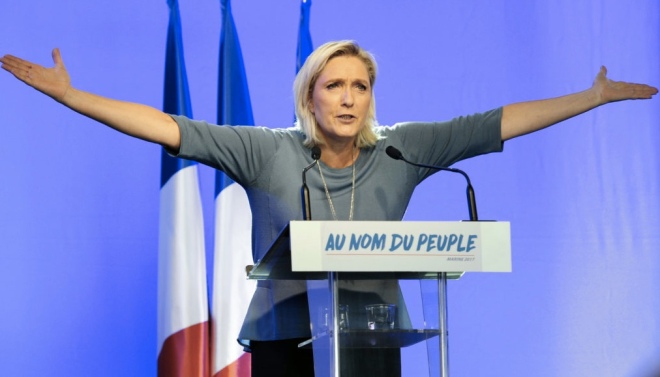
Could it happen? Could France fall to the extreme right for the first time since Vichy? Until this moment I would have said no. Recently, however, I have lost my certainty. In January, a YouGov poll indicated that 38% of French people thought a victory for Marine Le Pen – leader of France’s far right party, Le Front National (FN) – was “probable”; this even though not a single poll is predicting that she will actually become president. Why this gap between what so many people, including myself, know to be likely and what we believe?
I fear Marine Le Pen could win. Not just because in a world of Brexit and Trump anything is possible, but because for the first time in its Fifth Republic, France’s main crash barrier against the lure of extremism – her electoral system – no longer feels entirely reliable.
Introduced by referendum under de Gaulle in 1962 and designed to keep extremists out of power, France has a two-round voting system in which candidates must receive an absolute majority, or else go to a run off between the two people who have received the most votes. The result is that French electors have tended to use the first round to vote with their hearts – expressing things like hope, desire, rage or downright blood-mindedness – and the second round to vote with their heads. Something about the way in which Marine Le Pen has managed to hijack the political conversation of this traditionally idealistic nation and infuse it with despair, makes me doubt the efficacy of that crash barrier for the first time.
Ever since I first moved to France in the mid 80s, I have watched the FN grow in support and legitimacy. I’ve seen its base increase and the gap closing with mainstream parties. In April 2016 there were 57,000 paid up members of the FN compared with 86,171 in the Socialist Party (PS), which, since 2012, had lost 40,000 members. I’ve seen the FN put down roots in town halls across the south and in the post-industrial north and east, pushing out the extreme left from those blue collar communities thwarted by globalisation and forgotten or ignored by mainstream politicians. I’ve watched its scores improve in successive local, legislative and presidential elections. And In 2002, when its founder, Jean Marie Le Pen reached the second round of the presidential elections against the incumbent, Jacques Chirac, I watched with relief as the “republican pact” kicked in and left and right wing politicians came together and provoked an uplifting show of cross-party solidarity to keep the extremist, anti-republican Le Pen out of power.
That was the first time I saw my own children, Ella and Jack, then 14 and 16, get out onto the streets. Armed with a banner saying FN, NON! they joined an 800,000 strong, anti-Le Pen march in Paris. I remember feeling pleased to be raising my offspring in an environment where this kind of political mobilisation was still possible. The fact that nearly 17% of the electorate could come out and vote in favour of a man like Jean Marie Le Pen simply reminded me that France likes to play with fire and in a world where political belief was rapidly disappearing, that felt like no bad thing. The safety barrier would hold.
Fifteen years later the atmosphere is very different and there is little passion to offset the depressive mood gripping the nation. The excitement that drove my teenage children onto the streets is hard to imagine today. Jack, now 31 and Ella, 29, are both approaching this election from a place of disenchantment. Jack, who in the 2012 runoff between Sarkozy and Hollande, put in a blank vote for want of what he saw as any decent option, will in the first round pick Benoit Hamon as the only candidate who seems to have concern for the environment (as well as a few new ideas) and in the second round for anyone but Le Pen. Ella, who voted socialist in 2012, will vote in the first round for Hollande’s former Economy Minister, Emmanuel Macron – a 39 year-old ex-banker who has never been elected – and in the second round for anyone but Le Pen. Both Ella and her brother believe that a victory for Le Pen is possible. So does their cool-headed, pragmatic father Laurent, who has always had faith in the republican pact.
To reduce Le Pen’s chances of victory, Laurent, who voted socialist last time, had planned to vote for Francois Fillon of the centre right republican party (LR). That was before “Penelopegate” broke and it became clear that Fillon’s Welsh wife, Penelope (in France it’s pronounced penne-lop) had received 680,000 euros of public money for a parliamentary assistant job for which she appears not to have shown up, or at least not often. Laurent will now vote, without much enthusiasm, for Macron.
Like many of his peers in the Parisian elite, Laurent is all the more disgusted by Fillon for the fact that he had sold himself as the incorruptible honnete homme of this campaign. Next to Nicolas Sarkozy, who has been under investigation twice for nepotism and illegal political financing and Alain Juppé who was convicted for abuse of public funds as mayor of Bordeaux, Fillon seemed squeaky clean. Choosing the now ironic campaign slogan “Le Courage de la Vérité” (Courage for the Truth), Fillon promised to offer “a covenant of sincerity and honesty” to the French public. “Honour,” he said. “Must be the main virtue of the right. It’s one of the conditions of public confidence, one of the conditions too for re-establishing the authority of our institutions whose credibility we must restore.”
When it became clear that Fillon wasn’t going to resign over the scandal, Laurent was outraged: “He’s a terrible person, who’s taken France hostage with his pride.” At a dinner Party in Paris last week, Laurent heard someone saying that he felt so angry about Fillon’s behaviour that he’d probably vote for Le Pen if Fillon were in the second round with her. Five years ago I would not have believed anyone in this circle of bourgeois liberals capable of thinking such a thing, let alone saying it out loud.
My own family’s distress and its tangled voting intentions are a measure of just how bleak and chaotic the political landscape is in France. All the traditional boundaries have fallen and the old binary logic traditionally used to understand French politics no longer functions. French history has been driven by the confrontation between opposing political families representing two sets of ideals: Jacobins and royalists, Bonapartists and monarchists, moderate and radical republicans, the Popular Front and the nationalist leagues, resistants and collaborators, left and right. Today, to the dismay of pollsters and political analysts, French voters swing from left to right and back again and the electoral map seems to have become a mosaic of complex allegiances based, not on ideas but on such obscure and subjective criteria as whether or not you’re afraid of the future, or whether or not you’re inclined to take risks.
There is no question that the depressed mood is in part an expression of the collective trauma after the Islamist attacks of 2015 and 2016. Still living under a state of emergency, this nation built on ideals is structurally ill equipped for adversity, for which a pragmatic mind-set is much more useful. The emergency regime – which should have ended in July last year but was prolonged after the truck attack in Nice that killed 83 people on the night of the Bastille day celebrations – creates moral discomfort in politicians on both left and right. Measures like the outlawing of public demonstrations and the legalising of nightime house searches evoke to many the darkest days of the Occupation. Indeed it was interesting to note how France’s MPs – torn by the desire to live up to the ideals of liberty, equality and fraternity – rarely missed an opportunity to criticise the coercion laws proposed by the Valls government, while voting massively in their favour.
There is, in post-Freudian thought, a word for the special lure of despair. It is Thanatos, the Greek personification of death. Some psychoanalysts argue that trauma will trigger one of two competing unconscious drives in us, Eros ‘the life drive’, which controls the libido and strives towards pleasure and survival and Thanatos, ‘the death drive’ which unleashes rage, risky behaviours or despair (acedia from the Greek akedia – ‘without’ + kēdos ‘care’ or hope) and strives towards destruction of self or others. I’m reminded of the fact that the slogan of the French revolution was initially, Liberté, Egalité, Fraternité ou La Mort. The word Death was cut in 1794, after La Terreur (Robespierre’s reign of terror) in a bid, perhaps, to quit the realm of Thanatos for that of Eros.
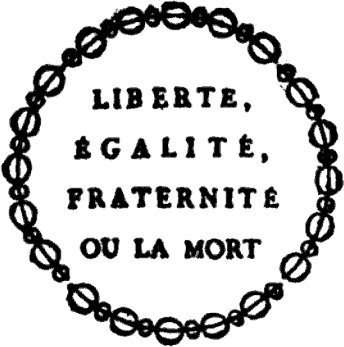
France’s response to the Nazi invasion of June 1940 makes sense when you look at it through the lens of the death drive triggered by trauma. It took six weeks for the Wehrmacht to overrun the country, sending millions fleeing from their homes. France’s lack of faith in its own institutions was at its lowest ebb. Paul Reynaud, head of an unstable government, resigned and parliament self-destructed by calling in an angel of death in the form of the ‘Victor of Verdun’, Marshall Petain. Striking a pact with the occupiers, the 84 year-old Marshall launched his own ‘National Revolution’, a four-year anti-parliamentarian regime of terror, bigotry and state-sponsored anti-Semitism.
Marine Le Pen denies she is Petain’s ideological heir and has worked tirelessly to hide any such sympathies, both in her party’s ranks and its history and even rejects the extreme right label for the FN. Claiming to be ‘neither left nor right’ but ‘republican’ Le Pen began paving her way to the mainstream in 2011 when she ousted her father as party president. So skilled has she been over the past six years at moral shape shifting that she clearly believes she can convince people of anything, including the idea that she is, actually, the rightful heir of de Gaulle.
It happened discreetly, on a beautiful weekend last September at an FN rally in Frejus where it runs the Town Hall. Marine Le Pen, bronzed and highlighted after a summer holiday on Corsica, subtly appropriated France’s Gaullist heritage. In a speech dripping with Gaullist language she cried, “On our soil are enemies that plan to impose their values on us (…) French policy is being dictated from abroad, by Brussels, Washington, Berlin! (…) What makes us grow is our concern for France…Our concern for la France libre (Free France)!” Wild cheering.
La France Libre was the name for de Gaulle’s government in exile in London from where he organised and supported the Resistance against the Nazis. Note how Le Pen chose the definite article – La France Libre and not une France libre – thereby making the reference absolutely clear. If you were ever in doubt that this was a rally of the extreme-right, however, the spontaneous chant that followed the applause would set you straight: “On est chez nous, on est chez nous!” (This is our land).
Marine Le Pen is France’s Thanathos, her ‘angel of death’. Perhaps her oponents instinctively know this and it explains why the socialist nominee, Benoit Hamon chose the impassioned slogan, Faire Battre le Coeur de la France (Let’s make France’s heart beat) and why Macron chose the dynamic, vital En Marche! Which means ‘walking/marching’ as well as ‘functioning’. Despite Le Pen’s plausible, professional exterior and an image of respectability that has been brilliantly achieved over her 23 years in politics – even with the extremely unfavourable legacy of her unrepentantly xenophobic father, Jean Marie – there’s no doubt that a vote for Marine Le Pen will be a manifestation of the unconscious drive towards risky or destructive behaviours. As Benoit Hamon rightly predicts, “If she comes to power, it will be a guaranteed firestorm in the suburbs,” and her pledge to leave the euro would, it seems, be a form of economic suicide.
According to a recent report by the liberal thinktank, L’Insitut Montaigne, a return to the franc would lead to a likely 15 % drop in the value of France’s currency compared to the euro, followed by a rise in interest rates and a massive flow of capital out of the country. France’s GDP, the report finds, would reduce by 2.3 % in the first year and by between 4% and 13% long-term. The cost of leaving the monetary union is evaluated at 7000 euros per French worker and the number of jobs potentially destroyed in the first year could reach the tens of thousands and, in the long term, as many 500,000. While the majority lamented the disappearance of their currency in 2002, a poll in 2014 found that 56% were hostile to its return. Still Le Pen, and those tempted by her, like to flirt with danger.
Although Marine Le Pen clamours her republican values, most French people know that the FN remains a party of the extreme right, one that builds its central thesis around the idea of France as a nation in decline, that blames ‘foreign’ forces on this decline, forces that include immigrants, the EU, the multinationals or “the banking lobby” (which, although no longer voiced in public, still evokes to many French people, as Le Pen well knows, the so-called ‘Jewish lobby’ that obsessed her father). The solution Le Pen proposes to France’s decline is to “put French people first” and to link a person’s civic rights to their origin, thereby establishing norms of what it means to be French.
Whatver her true colours, Marine Le Pen has managed to set the political agenda, which now revolves around her favourite subjects: immigration, security and national identity. Despite France’s founding equality myth, there is an underlying xenophobia in its culture, which has morphed from the anti-semitism that dominated in the 20th century, to the Islamophobia, which found its roots in France’s colonisation of the Maghreb and dominates today. Le Pen has learnt to tap this underlying prejudice without even naming it.
All politicians are aware of this xenophobic seam or ‘negative energy’ as Emmanuel Macron, a man partial to New Age terminology, might put it. Back in 1986 Mitterrand cynically manipulated it to his advantage in time for the general elections by re-introducing proportional representation, the only electoral system that would enable the FN to win any seats in parliament. The result was that Jean-Marie Le Pen’s party won thirty-five seats in the Assembly. By turning the FN into a legitimate political force for the first time, Mitterrand had split the newly elected right between those willing to form an alliance with an extreme right party and those who were appalled by the idea. Mitterrand at the same time delivered a fatal blow to his former allies on the extreme left, which has been losing voters to the FN ever since.
Years later Nicolas Sarkozy would tap the same dark vein by making eyes at FN voters during his presidential campaign of 2007. In 2009, he stoked the flames of national dischord a little more by calling for a “grand debate” on the question of national identity. “We are proud to have restored an unashamed conversation about national identity” and “what it means to be French.” Shortly after this, he announced, “the burqa is not welcome in France,” and in 2011 he banned wearing one in public places. In February 2011, strong in the knowledge that 42% of French people now believed Islam to represent a threat to their nation, Sarkozy launched another ‘grand debate’ on ‘Islam and secularity’. In 2012, after Marine Le Pen expressed her outrage that state school canteens should be serving halal meat, Sarkozy called for stricter rules on labelling and confirmed that serving halal meat in schools was in contradiction with French secular values. Sarkozy’s pusillanimity worked for him at first, but in the end backfired. People realised he was not ‘the real thing’ and votes began flowing back to Le Pen.
In her book, The Origins of Totalitarianism, Hannah Arendt wrote that behind the conventional parties lies “the slumbering majority,” or what Nixon would later call “the great silent majority,” which remains invisible as long as public attention focuses on the parties themselves. When faith in the party system breaks down, this entity, Arendt argues, emerges as “one great disorganised, unstructured mass of furious individuals.” Clearly France has reached this point and Marine Le Pen – who changed her campaign slogan from “La France Apaisée” (France at Peace) to “Au Nom du Peuple” (in the name of the people) – is talking straight over the heads of mainstream politicians to these furious masses.
Le Pen was already speaking to France’s silent majority in 2009 when she gunned for a former coal-mining town in the north east of France called Hénin-Beaumont. In an election that year to replace the incumbent Socialist mayor who had resigned after a corruption scandal, her party took first place in the first round with 39% of the vote. Her speeches started referring to “France’s forgotten ones” or “France’s invisible ones” and two years later this town in a region where unemployment hovers around 13%, fell to the FN.
Marine Le Pen also knows that out there lies a rich seam of untapped despair, legions of potential supporters ignored or despised by mainstream politicians: “neutral, politically indifferent people,” wrote Arendt. “Who never join a party and hardly ever go to the polls.” Indeed it is as though Le Pen knows instinctively what Hannah Arendt learnt in her observations of Stalinism and Nazism, that “masses are not held together by a consciousness of common interest and they lack that specific class-based articulateness for determined, limited, and obtainable goals.” In a way Le Pen is telling the truth when she says she is neither left nor right. Her target voters are simply demoralised individuals who do not like the world as it is. And if they are not yet demoralised, she will do her best to make them so.
One of Le Pen’s most effective techniques for spreading despair has been to harness the doctrine of “tous pourris”, (they’re all rotten). Borrowed from Coluche, France’s most popular comedian, the idea that politicians are instrinsically immoral no longer makes the French laugh. Increasingly, it makes them vote Le Pen. Financial scandals among the political classes help the contagion of despair but this is another miracle of Marine Le Pen’s brand: she herself is still perceived as ‘clean,’ despite the fact that she is under investigation for tax evasion and fraud. In 2013 a fraud case was brought against ‘Jeanne’, the micro-party that was set up by her entourage in 2011 to fund her presidential campaign. Last month she was called in for questioning by the French tax authorities who believe the Le Pen family – namely Marine, her elder sister, Yann and their father, Jean Marie – owes the treasury at least 3 million euros. The police now wish to question Marine Le Pen on a case involving her chief of staff and a fictional employment contract with the European Parliament (EP).
Le Pen’s reaction to this fake employment scandal is to call the investigation “a political cabal” and refuse to show up for questioning by the French judiciary police. It indicates just how untouchable she feels and how effectively she has eroded, not only the moral credibility of all things European, but the reputation of the French judiciary that she’s getting away with it. The Socialist Prime Minister, Bernard Cazeneuve, told AFP that if she wishes to hold the highest office Marine Le Pen “cannot place herself above the laws of the Republic (…) No political leader can refuse, if they are a republican, to answer a judicial summons. Respect for the authority of the state and its institutions begins there.” But it seems she can, for as most people know, Marine Le Pen is only a republican when it suits her.
Why do I fear that the republican pact, that old crash barrier, may not hold this time? Because thanks to the success of Le Pen’s message, in this mood of collective disgust, voting instructions given by mainstream politicians who have lost their moral ascendancy are more likely to be ignored. Because the ‘republican pact’ is no longer universally perceived as a rampart against extremism but has become, for many, the undemocratic manouvreings of a political elite clinging to power. Because this same republican pact may simply reinforce Marine Le Pen’s status as an outsider, a victim of ‘the system.’ Because this faux union of opposing political families to keep her out of power also feuls her new narrative for France as divided into two groups: the privileged few who are in favour of globalisation and the ‘forgotten’ masses who are against it, a strategy that not only masks her party’s extreme-right heritage but feeds the despair on which she depends.
A version of this post appeared in Prospect Magazine‘s April 2017 issue.

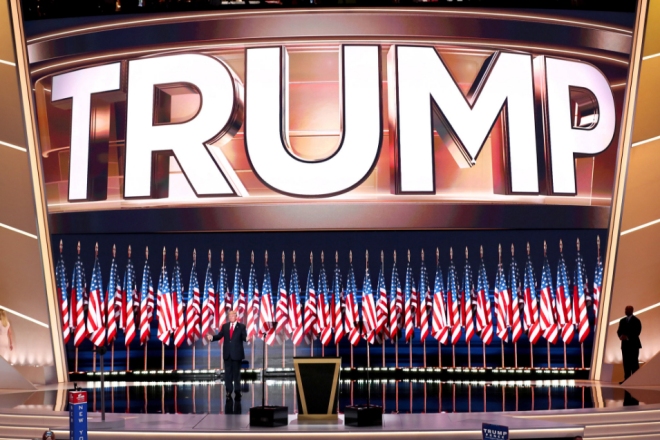
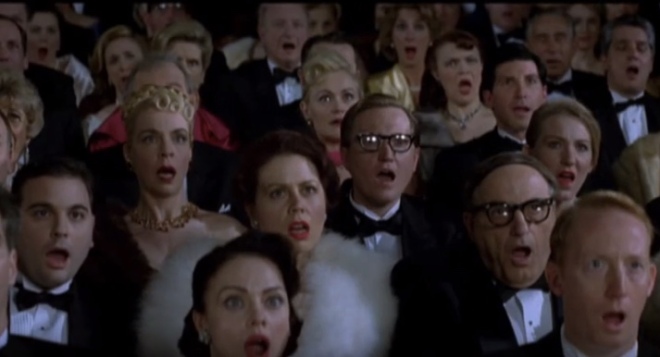 More than a week has passed since that most surreal of mornings when many of us woke to find that the world was entirely different to the one in which we had gone to sleep. My initial shock at Donald Trump’s election has been slowly replaced by a kind of frozen comic detachment at its continuing awfulness. As if with each successive news item featuring Trump I’m being made to watch Mel Brooks’
More than a week has passed since that most surreal of mornings when many of us woke to find that the world was entirely different to the one in which we had gone to sleep. My initial shock at Donald Trump’s election has been slowly replaced by a kind of frozen comic detachment at its continuing awfulness. As if with each successive news item featuring Trump I’m being made to watch Mel Brooks’ 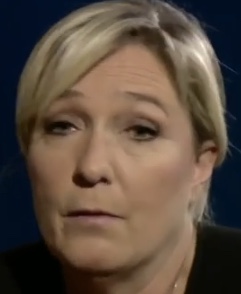 Marine Le Pen on the BBC
Marine Le Pen on the BBC
